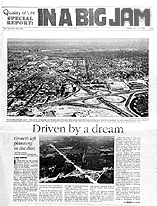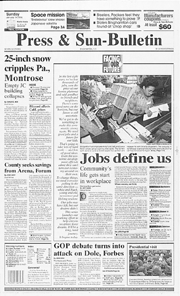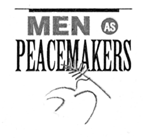Spring 1996
What’s Happening in Pew Center Projects
Peoria, Ill.
PARTNERS: THE JOURNAL STAR, WMBD-TV(CBS),WMBD-AM, WTVP (PBS),WCBU-FM (NPR), ILLINOIS CENTRAL COLLEGE OF PEORIA AND BRADLEYUNIVERSITY

The paper kicked off its “Leadership Challenge” coverage in January with a series of stories about the dearth of leaders. “Before, the staff had doubts about whether this was a story,” said managing editor Jack Brimeyer. “Now they are standing in line for our projects editor” with ideas for coverage. The business news staff, for instance, is exploring any benefits that accrue to businesses that support employees who are community leaders, the religion writer is examining leadership in local churches, and the legislative writer is reporting a package of stories on the price of involvement in political leadership. “It gave shape to some of the things they were thinking about anyway,” Brimeyer said.
Mail surveys are seeking input from graduates of the local communityleadership training program and are polling local businesses about practicesthat might encourage or discourage employees from being civic leaders. “Ithink it’s generating a lot of discussion on a lot of levels,” Brimeyersaid. The partners have plans for two more mail surveys – of minorities andretirees – then a broader telephone survey before they invite citizens toproblem-solving sessions.
Dayton, Ohio
PARTNERS: DAYTON DAILY NEWS, WPTDPUBLICTELEVISION, WYSO-FM, THEMIAMI VALLEY ISSUES FORUM, THE MONTGOMERY COUNTY HISTORICALMUSEUM
Drawing on Dayton’s history as a hub of industry and invention in the early1900’s, the partners set the stage for a community dialogue about itsfuture. The newspaper did a series identifying the region’s pastaccomplishments and identifying future challenges. That was followed inJanuary with a 90-minute television documentary and live TV paneldiscussion and phone-in. “The response was so great after we did thephone-in, the panel will come back again,” said Sandee Harden, director ofbroadcasting, Greater Dayton Public Television, adding that operators couldnot field all the calls. People called to share ideas, enroll for the nextday’s issues forum and request copies of the program.
Madison, Wis.
PARTNERS: WISCONSIN STATE JOURNAL,WISCONSINPUBLIC TELEVISION,WISCONSIN PUBLIC RADIO, WISC-TV (CBS) AND WOOD COMMUNICATIONSGROUP

Once again, the partners sponsored “You be the Judge,” an opportunity forcitizens to hear the two candidates for State Supreme Court present “closingarguments” to a panel of citizens sitting on the justices’ bench in theState Capitol. This time, though, they drew on past experience and added anew twist. In last year’s exercise, they learned that citizens did notalways ask the kinds of questions judicial candidates could answer -especially if the questions concerned an issue that might come before thecourt. So this time the partners asked two sitting judges for a dozenlandmark cases the court had decided in recent years. Citizens then selectedwhich cases they’d like the candidates to discuss as if the candidates hadbeen a member of the court at the time of the ruling. Citizens selected afreedom of speech case involving protesters at a shopping mall; a policesearch of curbside garbage for drugs; and a separation of church and statecase involving a village nativity scene. “These are good cases where peoplecan learn the candidates’ thinking,” said Tom Still, associate editor of theState Journal.
Coming in late April: the partners will invite citizen input on a hot-buttonissue – the future of the University of Wisconsin and its 26 campuses aroundthe state.
Hackensack, N.J.
PARTNERS: THE BERGEN RECORD, CAUCUSEDUCATIONALCORP., TCI OFNORTHERN NEW JERSEY, WJUX-FM

“In A Big Jam,” The Record’s four-part, 16-page in-depth report onwhytraffic is so difficult in Bergen and Passaic Counties kicked off in March.”It’s really everything you wanted to know about why it doesn’t work,” saidDavid Blomquist, the project’s director. Preceding the series, TheRecordconducted focus groups to gauge the public’s level of information on thetraffic problem. The stories generated lots of response from readers, whowere invited to call voice mail with comments and suggestions. Follow-upfocus groups will try to determine what readers learned from the reports.”We know this model works,” Blomquist said. The goal is to give readersenough information so “they can make a meaningful contribution” to futurediscussion about the problem. The Record is planning a “visioning”conference later this year that will bring together the public and expertsto discuss the issue. Traffic is the second topic tackled in newspaper’s”Quality of Life” civic journalism initiative; the first was education.
Portland, ME.
PARTNERS: PORTLAND PRESS HERALD,MAINE SUNDAYTELEGRAM, MAINE PUBLICBROADCASTING NETWORK, WGME-TV (CBS)

Ethics and morality were on the discussion agenda for 40 Sanford, Maine,residents at their second Citizens Meeting prior to the March 5 primary. Yetthe questions they wanted candidates to address dealt with the presidentialcampaign: What can we do about all the money that is spent in presidentialcampaigns? Why are there so many negative campaign ads on television?
“I though, oh my God, they got their assignment wrong,” said JeannineGuttman, Press Herald managing editor. “Then I realized that’s howthey seeethics and morality… Politicians think in terms of school prayer but[these citizens] were talking about this breakdown of trust between thepublic and their institutions.”
When Sen. Richard Lugar of Indiana later took questions from the group, thecitizens asked only about issues. “I thought that was very illuminating,”Guttman said. “If we had reporters there asking questions instead, it wouldhave been focused on campaign strategy: What are your polls showing? Whenare you going to drop out?”
“Maine Citizens Campaign ’96” is tracking the deliberations of the group ofSanford citizens for a year. The citizens are gathering once every six weeksto discuss their issues. Between meetings, study circles of 10 citizens meetonce or twice for a discussion facilitated by the Maine RoundtableCenter.
Binghamton, N.Y.
PARTNERS: THE PRESS & SUN-BULLETIN,WBNG-TV(CBS), WSKG PUBLICTELEVISION AND PUBLIC RADIO, SUNY-BINGHAMTON

With their January debut, the partners have begun examining what can be doneabout massive corporate downsizing in the region. The newspaper has runthree-part series in January, February and March, focusing on jobs, andideas for revitalizing the region’s economy and diversifying it. WBNG alsohas aired a series of stories and WSKG has broadcast two hour-long specials.So far, more than 550 citizens have responded with feedback or volunteeredto participate. At a televised town meeting April 18, citizens will meet todiscuss ideas for future economic development and sign up for one of 10action teams on such topics as venture capital, government cooperation,education. The teams will work independently of the media partners throughthe summer to research solutions and possible actions. Their recommendationswill be publicized.
At Binghamton University, 150 citizens in seven focus groups have beendiscussing what they consider to be the area’s economic needs. Meanwhile, inMarch, hundreds of schoolchildren, grades 3 through 12, began participatingin NYLINK, a WSKG project to enable the students to use their schoolcomputers to talk to one another about their future. The newspaper plans topublish their responses. Meanwhile, an 18-student High School Task Forcewill present a report to the public in May.
Cincinnati, Ohio
PARTNERS: WKRC-TV (ABC), THECOMMUNITY PRESS 22SUBURBAN WEEKLIES,Q102-FM AND WNNK-FM
Do Cincinnatians want to pay a higher sales tax to build two news sportsstadiums: one for the Reds and one for the Bengals? The partners worked toget answers to citizens’ questions prior to a March 19 referendum on theissue. WKRC answered two to three viewers’ questions on its nightly newsbroadcasts and its Sunday morning public affairs programs. And everyWednesday, the weekly newspapers answered reader questions about the taxmeasure. The coverage led up to a televised special March 15. Preliminaryresults of a University of Cincinnati poll taken earlier in the year arepinpointing other issues that Cincinnatians would like the media partners tocover.
Seattle, Wash.
PARTNERS: SEATTLE TIMES, KPLU-FM ANDKUOW-FMPUBLIC RADIO, KCTSPUBLIC TELEVISION

KCTS-TV has joined the media alliance, which has been underway since the1994 elections. The partners have hired a coordinator and are developing astatewide poll that will be conducted in April. This year’s coverage, whichwill focus on the presidential and gubernatorial elections, will be launchedin May.
Rochester, N.Y.
PARTNERS: THE DEMOCRAT AND CHRONICLEANDTIMES-UNION, WXXI-TV PUBLICTELEVISION, WXXI-AM
Talks are underway with a commercial television station that might join themedia alliance. Meanwhile, the partners have prepared poll questions forabout 370 seventh through twelfth graders about education and violence. Theyplan to gather the young people in early June for a Youth Summit. Thenewspapers will do intensive coverage, fleshing out the issues and findingsin the poll, all leading up to a televised documentary special in September.
Duluth, Minn.
PARTNERS: DULUTH NEWS-TRIBUNE,WDSE-TV PUBLICTELEVISION, VIOLENCEFREE DULUTH COMMUNITY ORGANIZATION

In March, the newspaper launched its first installment of a seriesexamining the various ways people are affected by violence and how theylearn to be violent, for example through sports, the media, peers, parents.Production also began on a video about violence that would be distributed inthe schools. The partners are gathering information for a resource guidethat would give the community options for getting involved in doingsomething about violence.
Tallahassee, Fla.
PARTNERS: TALLAHASSEE DEMOCRAT, WCTV6(CBS),FLORIDA A&M UNIVERSITYAND FLORIDA STATE UNIVERSITY
About 100 Tallahasseans attended “The Public Agenda’s” fourth CommunityDialogue on Jan. 30 and immediately broke into discussion groups. Two newgroups were formed – on culture and on traffic – as a result of a surveyafter the initiative’s first year. The traffic group has since merged withthe growth and environment group. The initial education group has splitinto two groups, one meeting on education and the other on children andvalues. And the crime group has unveiled its new Web page, which tried toput into understandable language the various punishments for juvenile andother violations. Tallahassee teenagers, meanwhile, are actively workingwith the city to create a teen center or skate park.
